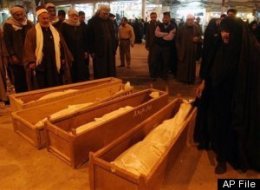Human Rights Watch
NEW YORK, New York, United States – The military commission sentencing jury at Guantanamo should fully take into account Omar Khadr’s status as a former child soldier captured when he was 15, Human Rights Watch said today. According to media reports, Khadr accepted a plea deal on October 25, 2010, to purported war crimes and other charges, making the US the first Western nation since World War II to convict someone for acts committed as a child in a war crimes tribunal.
“The US treatment of Omar Khadr has been at odds with international standards on juvenile justice and child soldiers from the very beginning,” said Jo Becker, children’s rights advocacy director at Human Rights Watch. “As the military jurors consider sentencing this week, they need to take Khadr’s status as a child offender into account.”
Khadr, a Canadian citizen, has already spent more than eight years in US military custody. The terms of the plea deal have not yet been made public. Khadr was facing life in prison on the charges against him, which included murder and attempted murder in violation of the laws of war, conspiracy, providing material support for terrorism, and spying.
A sentencing hearing, which is scheduled to begin on October 26, 2010, will still take place, and a lesser sentence could be imposed. During the hearing, prosecutors plan to put forward 10 sentencing witnesses and the defense four. A military jury of seven will listen to sentencing evidence and then decide upon a sentence, which will be imposed if it less than that reached by the plea agreement.
“The US government’s failure to taken into account Khadr’s age should not persist at his sentencing,” Becker said. “The US Supreme Court has repeatedly recognized that adolescents lack the experience, perspective, and judgment of adults and should be treated differently.”
Khadr, now 24, was prosecuted for the killing of US Army Sgt. 1st Class Christopher Speer. Speer was killed on July 27, 2002, after US forces entered a compound in Afghanistan where Khadr and others were located and a firefight ensued. Prosecutors alleged that during the firefight, Khadr threw the grenade that killed Speer and wounded others. Khadr was also seriously wounded in the firefight with two bullet wounds in his chest.
After Khadr was captured, he was taken to Bagram Air Base in Afghanistan. While there he was forced into painful stress positions, threatened with rape, hooded, and confronted with barking dogs. The government’s own witnesses confirmed some of this treatment when they testified that Khadr was interrogated while strapped down on a stretcher just 12 hours after sustaining his life-threatening injuries. They also testified he was threatened with rape if he did not cooperate.
In October 2002, Khadr was transferred to Guantanamo where the abuse continued. He told his lawyers that he was shackled in painful positions, told he would be sent to Egypt, Syria, or Jordan for torture, and used as a “human mop” after he urinated on the floor during one interrogation session.
He was deprived of all access to legal counsel until November 2004, more than two years after he was first detained. At some point during his interrogations, Khadr confessed to throwing the grenade that killed Speer, although up until today he had recanted that confession on the basis that it was coerced.
While child offenders may be prosecuted for war crimes, the US has failed throughout Khadr’s detention to afford him the protections provided to children under international law. Under the Optional Protocol to the Convention on the Rights of the Child on the Involvement of Children in Armed Conflict (Optional Protocol), which the United States ratified in 2002, the US is obligated to recognize the special situation of children who have been recruited or used in armed conflict.
The Optional Protocol requires the rehabilitation of former child soldiers within a state party’s jurisdiction, mandating that states provide “all appropriate assistance for their physical and psychological recovery and their social reintegration.” Under the Convention on the Rights of the Child, to which the US is a signatory, governments should ensure that the imprisonment of a child offender “shall be used only as a measure of last resort and for the shortest appropriate period of time.”
“The recruitment and use of child soldiers is regarded as a serious human rights abuse and international standards for dealing with former child soldiers emphasize rehabilitation, not punitive approaches,” Becker said.
Andrea Prasow, senior counterterrorism counsel at Human Rights Watch, is currently in Guantanamo Bay and will be monitoring the sentencing proceedings.
For more Human Rights Watch reporting on Guantanamo, please visit:
http://www.hrw.org/en/category/topic/counterterrorism
For more information, please contact:
In Guantanamo Bay, Andrea Prasow (English): prasowa@hrw.org; follow tweets at http://twitter.com/andreaprasow
In New York, Jo Becker (English): +1-212-216-1236; or +1-914-263-9643(mobile); or beckerj@hrw.org
In New York, Joanne Mariner (English): +1-212-216-1218; or +1-917-647-4588 (mobile); or marinej@hrw.org
In New York, Laura Pitter (English): +1-212- 216-1897; or +1-917-450-4361 (mobile); or pitterl@hrw.org
